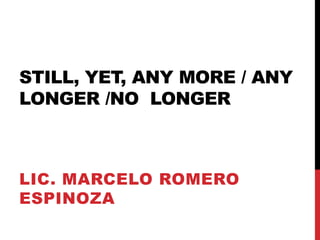
Still, yet, any more
- 1. STILL, YET, ANY MORE / ANY LONGER /NO LONGER LIC. MARCELO ROMERO ESPINOZA
- 2. In affirmative sentences and questions we use STILL to talk about an action or a situation which is continuing longer than we expected. We put STILL in mid-position: after the verb BE, before a main verb on its own, and between an auxiliary and the main verb. • Harry’s 91. Does he still live on his own? • Yes, And he still drives a car. He’s still very active.
- 3. Harry’s 91. Does he still live on his own? Yes, And he still drives a car. He’s still very active.
- 4. We use YET in negative sentences and in questions. We use it to talk about something that hasn’t happened, but we expect to happen in the future. YET usually goes at the end of a sentence or a clause. • Have you finished that letter yet? • No, I haven’t finished it yet, but it won’t be long. In negative sentences, if we want to show surprise, concern or anger that something hasn’t happened up to now, we use STILL for emphasis (rather than YET).
- 5. Have you finished that letter yet? No, I haven’t finished it yet, but it won’t be long.
- 6. We put STILL before an auxiliary verb. • Have you found your keys yet? • No, I’ve been looking for them for hours and I still haven’t found them. (NOT I haven’t still found them) We use ANY MORE or ANY LONGER in negative sentences. We use them to say that a past situation has now finished . We usually put them at the end of a sentence or a clause. ANY MORE is more common than ANY LONGER.
- 7. Have you found your keys yet? No, I’ve been looking for them for hours and I still haven’t found them.
- 8. • She doesn’t go skiing any more. • They don’t live here any longer. We can use NO LONGER with an affirmative verb instead of ANY MORE/ANY LONGER with a negative verb. The meaning is the same, but NO LONGER is more formal and less common. We put NO LONGER in mid- position. • She no longer works at the school She doesn’t work at the school any more.
- 9. • She no longer works at the school • She doesn’t work at the school any more.
- 10. • She’s no longer a teacher. She isn’t a teacher any longer. 1. Max Firth has got eight children. He takes them to school, but this morning they are not ready. Max is telling them to hurry up. Give their replies, using STILL or YET. a. John and Joe. Hurry up. Are you still eating? b. Yes, we (not finish, our breakfast) _________________________________ Yes we haven’t finished our breakfast yet.
- 11. b. Laura! Are you ready? No, I’m (in the bathroom) _______________________________ No, I’m still in the bathroom. c. Simon! Are you still upstairs? Yes. I’m (get dressed) _________________________________ Yes, I’m still getting dressed.
- 12. d. John, where is Helen? She (in bed) ______________________________ She is still in bed. e. And where are the twins? They (not finish/their homework) _______________________________ They haven’t finished their homework yet. f. Carla! It’s time for school. I (not make/my sandwiches)
- 13. __________________________________ I haven’t made my sandwiches yet. 2. Gerry Hardman is angry and worried. He has got money problems. He has not got a job. He has got a serious eye infection. He feels depressed. Complete what he says, using STILL. a. My friend Simon owes me £ 20. He (not pay me back) _______________________________ He still hasn’t paid me back.
- 14. b. I sent him a letter two weeks ago. He (Not reply) _________________________________ He still hasn’t replied. c. I applied for a job three weeks ago. I’m (wait for an interview) ________________________________ I’m still waiting for an interview. d. I had an operation on my eyes a month ago. I (not see very well) ____________________________________ I still can’t see very well.
- 15. d. I’m taking anti-depressant tablets, but I’m (not feel well) _________________________________ But I’m still not feeling well. 3. On January 1st many people in Britain make “New Year resolutions”. They decide to change things in their lives. The Wills family have made their resolutions. Complete the sentences, using STILL, YET, ANY LONGER, ANY MORE, NO LONGER.
- 16. a. (Norman Wills) I (1)___________ spend too much time away from the family. I’m not going to work on Saturdays (2)_________. (1) still /(2) any more b. (Sarah Wills)I (1) _______ intend to do all the cooking. I’m not going to make all the meals at the weekend (2) ___________. (1) no longer / (2) any more, any longer.
- 17. c. (Jenny) My brother Oliver (1) _________ makes me angry. He hasn’t apologised for breaking my CD player (2)___________. But I’ve decided . I’m not to get angry with him (3) ___________. (1) still/ (2) yet / (3) any more. d. (Oliver) I haven’t made any resolutions (1)__________. I (2)_________ haven’t decided what I’m going to change. Last Year I said I wouldn’t smoke (3)_________, but I ________ smoke. Perhaps this year I’ll try to be nice to my sister, but I haven’t told her (4)________.
- 18. (1) yet / (2) still / (3) any more / (4) still / (5) yet.
